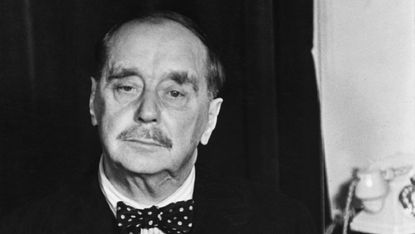Book of the week: The Young H.G. Wells by Claire Tomalin
Tomalin’s ‘compulsively readable’ book shows how Wells became the ‘great prophet of the modern age’

“Nobody predicted the 21st century better than H.G. Wells,” said Kathryn Hughes in the Daily Mail. Born “when Queen Victoria was still youngish”, he wrote a series of bestselling page-turners about “men on the Moon, environmental disaster, class war” and racial oppression – as well as “Martians invading the Earth”.
He was the product of a “working-class family of limited means”: his father was a shopkeeper in Bromley, his mother a lady’s maid. Wells was a sickly child who essentially educated himself by “reading books in bed while recovering from life-threatening lung infections”. Yet he triumphantly surmounted these obstacles, becoming an astonishingly prolific author, as well as a “passionate socialist” and a relentless erotic adventurer (today, he would probably be branded a “sex addict”). In this “compulsively readable” biography, Claire Tomalin shows how Wells’s early experiences helped turn him into the “great prophet of the modern age”.
Focusing on his first four decades, The Young H.G. Wells gives its “keenest attention” to its subject’s personal relationships, said John Carey in The Sunday Times. Wells didn’t let two marriages (the first to his cousin Isabel, the second to one of his former students, Amy Robbins) stand in the way of his promiscuous nature. Women found him irresistibly attractive – he “smelt deliciously of honey”, one said – and his many lovers included Rebecca West, with whom he fathered a son.
Subscribe to The Week
Escape your echo chamber. Get the facts behind the news, plus analysis from multiple perspectives.

Sign up for The Week's Free Newsletters
From our morning news briefing to a weekly Good News Newsletter, get the best of The Week delivered directly to your inbox.
From our morning news briefing to a weekly Good News Newsletter, get the best of The Week delivered directly to your inbox.
Being his wife can’t have been fun, said Anthony Cummins in The Observer: Robbins – whom Wells insisted on calling Jane – was even cajoled into buying clothes for another lover’s baby. Tomalin sometimes sounds as if she approves of such behaviour: Wells, she writes, “knew how to… enjoy women and the world” – words that “sit ill” with the shabby conduct she skilfully portrays.
I found all the “love stuff” a bit of a drag, said Laura Freeman in The Times. By contrast, “the book stuff soars”. Wells was astonishingly versatile as a writer, churning out novels, short stories and reams of journalism as well as hard-hitting polemics (his anti-poverty tract, The Misery of Boots, can still “send a shiver up the spine”). He mixed with the likes of Henry James, George Gissing and Arnold Bennett.
“To this day, no one fully understands how one man, albeit a genius, was able to write so much and so well,” said Michael Dirda in The Washington Post. For a “compact overview” of this “endlessly fascinating man and writer”, Tomalin’s biography is “hard to beat”.
Viking 256pp £20; The Week Bookshop £15.99

The Week Bookshop
To order this title or any other book in print, visit theweekbookshop.co.uk, or speak to a bookseller on 020-3176 3835. Opening times: Monday to Saturday 9am-5.30pm and Sunday 10am-4pm.
Create an account with the same email registered to your subscription to unlock access.
Sign up for Today's Best Articles in your inbox
A free daily email with the biggest news stories of the day – and the best features from TheWeek.com
-
 Today's political cartoons - April 17, 2024
Today's political cartoons - April 17, 2024Cartoons Wednesday's cartoons - political anxiety, jury sorting hat, and more
By The Week US Published
-
 Arid Gulf states hit with year's worth of rain
Arid Gulf states hit with year's worth of rainSpeed Read The historic flooding in Dubai is tied to climate change
By Peter Weber, The Week US Published
-
 USC under fire for canceling valedictorian speech
USC under fire for canceling valedictorian speechSpeed Read Citing safety concerns, the university canceled a pro-Palestinian student's speech
By Rafi Schwartz, The Week US Published
-
 6 serene homes in Vermont
6 serene homes in VermontFeatures Featuring a four-level Shaker barn in Hartland and a Scandinavian-inspired home in Stowe
By The Week US Published
-
 Amanda Montell's 6 favorite books that will expand your knowledge
Amanda Montell's 6 favorite books that will expand your knowledgeFeature The linguist recommends works by Mary Roach, Alice Carrière, and more
By The Week US Published
-
 Rowan Beaird recommends 6 compelling books from the 1950s
Rowan Beaird recommends 6 compelling books from the 1950sFeature The author recommends works by Patricia Highsmith, Shirley Jackson, and more
By The Week US Published
-
 6 spacious homes with great rec rooms
6 spacious homes with great rec roomsFeature Featuring a suspended fireplace in Arizona and a marine-themed home in Maine
By The Week Published
-
 Recipe: gnocchi di spinaci (spinach gnocchi)
Recipe: gnocchi di spinaci (spinach gnocchi)The Week Recommends Forget the potatoes for this gnocchi made of the 'classic combination' of spinach and ricotta
By The Week UK Published
-
 Stephen Graham Jones' 6 scary books with deeper meanings
Stephen Graham Jones' 6 scary books with deeper meaningsFeature The best-selling author recommends works by Stephen King, Sara Gran, and more
By The Week US Published
-
 6 stylish homes on the top floor
6 stylish homes on the top floorFeature Featuring a 1925 art deco high-rise in San Francisco and a factory-turned-home in Los Angeles
By The Week US Published
-
 The Anxious Generation: US psychologist Jonathan Haidt's 'urgent and essential' new book
The Anxious Generation: US psychologist Jonathan Haidt's 'urgent and essential' new bookThe Week Recommends Haidt calls out 'the Great Rewiring of Childhood' phenomenon
By The Week UK Published